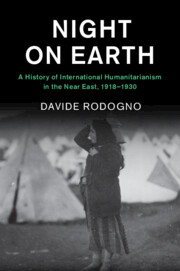Refine search
Actions for selected content:
12 results
1 - The Historical Foundations of Community Commitment
-
- Book:
- We Choose You
- Published online:
- 06 February 2025
- Print publication:
- 13 February 2025, pp 23-45
-
- Chapter
- Export citation
Confronting the Deportation State: Black American Responses to Immigrant Expulsion in the Interwar Period
-
- Journal:
- Modern American History / Volume 7 / Issue 2 / July 2024
- Published online by Cambridge University Press:
- 06 September 2024, pp. 181-203
-
- Article
-
- You have access
- Open access
- HTML
- Export citation
Hamilton Fish Armstrong and Yugoslavia: How an Internationalist's Idea of a New State Made Interwar-Era Foreign Affairs—and Foreign Affairs
-
- Journal:
- Modern American History / Volume 7 / Issue 1 / March 2024
- Published online by Cambridge University Press:
- 20 March 2024, pp. 1-23
-
- Article
-
- You have access
- Open access
- HTML
- Export citation
Experts, Democracy, and the Historical Irony of U.S. Tax Policy: Thomas S. Adams and the Beginnings of the Value-Added Tax
-
- Journal:
- Modern American History / Volume 5 / Issue 3 / November 2022
- Published online by Cambridge University Press:
- 22 December 2022, pp. 239-262
-
- Article
-
- You have access
- HTML
- Export citation
Birth Registration and the Administration of White Supremacy
-
- Journal:
- Modern American History / Volume 5 / Issue 2 / July 2022
- Published online by Cambridge University Press:
- 11 August 2022, pp. 117-141
-
- Article
-
- You have access
- HTML
- Export citation

Night on Earth
- A History of International Humanitarianism in the Near East, 1918–1930
-
- Published online:
- 10 December 2021
- Print publication:
- 09 December 2021
Introduction
-
- Book:
- Night on Earth
- Published online:
- 10 December 2021
- Print publication:
- 09 December 2021, pp 1-28
-
- Chapter
- Export citation
Prescribing Sound: Willem Van de Wall and the Carceral Origins of American Music Therapy
-
- Journal:
- Modern American History / Volume 3 / Issue 2-3 / November 2020
- Published online by Cambridge University Press:
- 04 June 2020, pp. 109-132
-
- Article
-
- You have access
- HTML
- Export citation
The Longer History of Imperial Incidents on the Yangtze
-
- Journal:
- Modern American History / Volume 3 / Issue 1 / March 2020
- Published online by Cambridge University Press:
- 16 March 2020, pp. 87-91
-
- Article
- Export citation
Radio as a Tool of Empire. Intercontinental Broadcasting from the Netherlands to the Dutch East Indies in the 1920s and 1930s
-
- Journal:
- Itinerario / Volume 40 / Issue 1 / April 2016
- Published online by Cambridge University Press:
- 29 March 2016, pp. 83-103
-
- Article
- Export citation
14 - Privatewelfare and the welfare state
-
-
- Book:
- The Cambridge History of Capitalism
- Published online:
- 05 March 2014
- Print publication:
- 23 January 2014, pp 464-500
-
- Chapter
- Export citation
Venezuela's Nascent Oil Industry and the 1932 US Tariff on Crude Oil Imports, 1927–1935*
-
- Journal:
- Revista de Historia Economica - Journal of Iberian and Latin American Economic History / Volume 27 / Issue 3 / Invierno 2009
- Published online by Cambridge University Press:
- 13 January 2010, pp. 427-462
- Print publication:
- Invierno 2009
-
- Article
- Export citation
